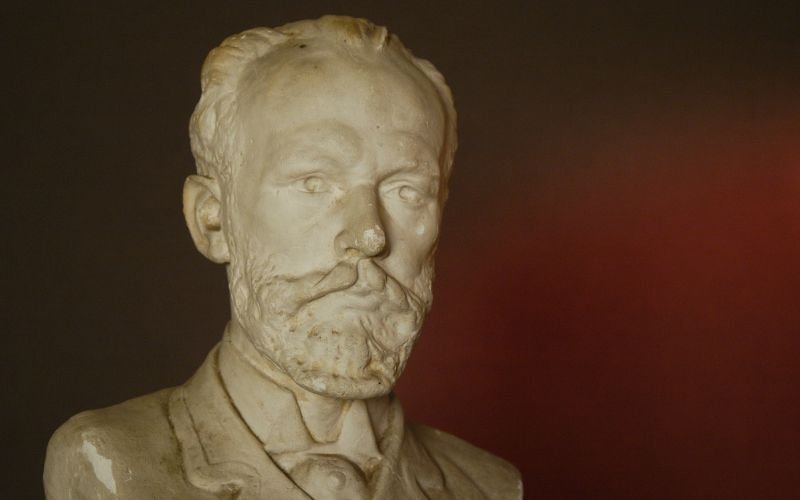PROFILE - Pyotr Ilyich Tchaikovsky (1840 - 1893)
Born in Russia in 1840, Pyotr Ilyich Tchaikovsky is much more than a classical composer: he embodies the romantic genius of the 19th century. Both a revered artist and a complex man, he shook up the history of music with such timeless works as Swan Lake, The Nutcracker and the Symphonie Pathétique. Endowed with an exceptional talent for capturing emotions, he fused the richness of Russian music with universal appeal.
But behind these masterpieces lies a man plagued by many doubts. Did you know that Swan Lake was a failure at its premiere? Or that his first piano teacher doubted that Tchaikovsky could ever excel as a composer? Between resounding success and intimate anguish, his journey illustrates that of a romantic master who was able to transform his torments into eternal music.
Tchaikovsky's youth and early life: between music and doubts
A child prodigy in the Ural landscape
Pyotr Ilyich Tchaikovsky was born on May 7, 1840 in Votkinsk, an industrial town nestled in the Russian Urals. Surrounded by a loving family, he was immersed from an early age in a world where music held a privileged place. His mother, Alexandra, a talented pianist, instilled a love of the art in her son, while his engineer father, Ilia, ensured that he received a well-rounded education. At just 5 years of age, little Piotr already plays the piano with an ease that surprises those around him.
But Tchaikovsky's childhood was also tinged with pain. In 1848, the family moved several times due to his father's professional obligations. But it was in 1854 that he suffered a devastating loss: the death of his mother from cholera. This tragedy marked him for life, and nurtured the sensitivity he would later express in his music.
A law student with a passion for music
At the age of 10, Piotr left his hometown to attend the Imperial School of Jurisprudence in St. Petersburg, a prestigious institution designed to train Russia's administrative elite. Despite the distance from his family, he found an outlet in music. He attended operas, immersed himself in concerts and quietly nurtured his musical dream.
Yet the path seemed clear: in 19th-century Russia, becoming a composer was not a "respectable" profession for the upper classes. In 1859, a graduate and employee of the Ministry of Justice, he led a civil servant's life that brought him neither fulfillment nor satisfaction. But deep inside him, a certainty grew: his place was elsewhere, in the scores and not behind a desk.
The leap into music: an assumed vocation
In 1863, at the age of 23, Tchaikovsky took the plunge and left behind the stability of his legal career to devote himself fully to music. He joined the St. Petersburg Conservatory, under the direction of Anton Rubinstein.
The young composer put his heart and soul into his musical studies. This blend of academic rigor and personal creativity became the signature of his style. In 1866, after graduating from the Conservatory, he accepted ateaching positionat the Moscow Conservatory. This marked the beginning of his career, where his talent was soon recognized beyond Russian borders.
🎶 5 anecdotes to remember about Tchaikovsky
Unloved ballets in their early days
Swan Lake was a flop when it premiered in 1877. Audiences and critics were unconvinced by either the work or the production. It was only after his death that the ballet gained in popularity, becoming a masterpiece of the classical repertoire.
A composer... self-critical
Tchaikovsky was known for his harsh self-criticism. He considered some of his works, which he judged insufficiently accomplished or too ambitious, to be inferior to what he had imagined. Yet many of his compositions are among the most highly regarded in classical music today.
A strange fear during his concerts
Tchaikovsky is said to have feared that his head would come off while he was beating time. This rumor originated in the fact that he sometimes placed a hand on his head while conducting the orchestra. While this story remains difficult to verify and has fueled much speculation, it does illustrate the extreme sensitivity and anxieties that characterized the composer.
A piano teacher who didn't believe in himself
When Tchaikovsky began his musical studies, his piano teacher, Rudolph Kündinger, doubted his future in classical music. Although he recognized his excellent musical ear, he saw in him neither a great composer nor a promising performer.
A disastrous marriage
Forced by the norms of his time to hide his homosexuality, Tchaikovsky married Antonina Miliukova in 1877. This hasty and unhappy marriage lasted only two months.
Pyotr Tchaikovsky's meteoric rise: from early works to recognition
Winter Dreams: an icy symphony that melts hearts
In 1868, Tchaikovsky unveiled his Symphony No.1 "Winter Dreams". Inspired by the snowy landscapes of his native Russia, this work transports listeners into a world at once melancholy and full of vitality. Although still imbued with a certain naiveté, it already reveals the composer's uncommon sensitivity and talent for capturing emotions.
Yet composing this symphony was no picnic: a perfectionist plagued by self-doubt, Tchaikovsky saw it as a personal challenge. But the result marked the start of a career in which his style, combining emotional intensity and musical daring, began to stand out.
Nadejda von Meck: between muse and shadowy patron
One of the turning points in Tchaikovsky's life was undoubtedly his epistolary encounter with Nadejda von Meck in 1877. This wealthy widow, passionate about music and an admirer of his work, became not only a patron of the composer, but also a confidante through correspondence. For over a decade, she supported Tchaikovsky financially, enabling him to compose and devote himself to his art.
Although they never met in person, their epistolary relationship was intense and prolific: they exchanged over 1,200 letters in which Tchaikovsky shared his anxieties, inspirations and victories. Their relationship came to an end in 1890, when Nadejda von Meck withdrew her support, either due to financial difficulties or to Tchaikovsky's growing awareness of his homosexuality (nothing had been officially confirmed).
Tchaikovsky's masterpieces: magic, drama and tradition
Tchaikovsky was a jack-of-all-trades who refused to confine himself to a single musical style. Over the years, he explored different genres, adding his own signature touch to orchestral compositions.
Ballets: timeless classics that still enchant today
Tchaikovsky transformed the ballet, often perceived as light-hearted, into an art form rich in depth and emotion. He composed three ballets during his career: The Nutcracker, Swan Lake and Sleeping Beauty.
Swan Lake (1876 ): this ballet, which has become an emblem of Romanticism, is a veritable revolution in the history of dance. With its themes of impossible love and tragedy, its melodies made a lasting impression. However, when it premiered, the work was not as successful as had been hoped, partly because the staging was considered mediocre and Tchaikovsky's music was poorly interpreted.
The Nutcracker (1892 ): this musical gem is a must for every holiday season. Inspired by Hoffmann's fairy tale, The Nutcracker transports the audience into a fairytale world of animated toys and enchanting landscapes. Tchaikovsky considered the work a minor one, believing it to be too light and intended primarily for a young audience, and never imagined that it would become one of the world's most popular ballets.
Sleeping Beauty (1890 ): this ballet, inspired by Charles Perrault's fairy tale, is one of Tchaikovsky's most ambitious, with rich, complex music, particularly in its use oforchestra.
Tchaikovsky's symphonies: a mirror of his tormented soul
Tchaikovsky expresses the inner turmoil and human passions with unparalleled intensity in his six symphonies, including :
Symphony n°4 (1877-1878): written during a difficult period in his life, this work reflects his personal emotions. The themes of destiny and the struggle against adversity are treated with such intensity that no one can remain unmoved.
Symphony no. 6, nicknamed "Pathétique" (1893 ): his last symphony is often considered his absolute masterpiece. Loaded with melancholy and resignation, it almost seems to herald its own end. Performed just a few days before his death, it remains one of the most striking works in the entire symphonic repertoire.
Operas: a tribute to the Russian soul
Tchaikovsky drew on Russian literature to compose operas that combine drama, emotion and musical richness. He composed 11 operas, two of which stand out:
Eugene Onegin (1879 ): adapted from Pushkin's masterpiece, this opera tells the story of unrequited love and the regrets that ensue. Tchaikovsky finely depicts the emotions and psychology of the characters.
The Queen of Spades (1890 ): inspired by another Pushkin story, this opera delves into the themes of greed and fate. Its intense music and story make it one of the greatest masterpieces of Russian opera.
The concertos: virtuosity and raw emotion
Tchaikovsky left his mark not only on ballets and symphonies, but also on the concerto repertoire, especially with his famous Violin Concerto in D major, Op. 35 (1878).
Composed during a period of convalescence and introspection, this concerto is an ode to virtuosity and lyricism. Yet its history began in controversy: judged "unplayable" by Leopold Auer, the violinist to whom it was dedicated, it was finally premiered by Adolph Brodsky in Vienna in 1881, but provoked acerbic criticism. In time, it became one of the greatest violin concertos, adored for its melodic flights and technical challenges.
The end of a genius: between international success and grey areas
In his later years, Tchaikovsky enjoyed worldwide recognition. He was invited to conduct his works in prestigious cities, including the inauguration of Carnegie Hall in New York in 1891. His compositions, hailed for their emotional intensity and virtuosity, made him a key figure in classical music.
But behind this glory lies a deeply tormented man. Loneliness, the criticism of his time and the social pressures of his private life weigh heavily on his morale.
On November 6, 1893, a few days after the premiere of his Symphony n°6 "Pathétique", Tchaikovsky died in St. Petersburg. Officially, his death was attributed to cholera after drinking contaminated water, but the exact circumstances remain shrouded in mystery. Some suggest suicide, a hypothesis that continues to divide experts.
Tchaikovsky's influence spans the centuries. Considered a titan of classical music, his works continue to enchant concert halls and ballet theaters the world over. His music, synonymous with emotional depth and technical virtuosity, continues to inspire musicians and composers alike, and remains a valuable source of study for music scholars.
Pyotr Ilyich Tchaikovsky in brief: a career marked by masterpieces
May 7, 1840: Birth of Pyotr Ilyich Tchaikovsky in Votkinsk, Russia.
1850: Beginning of his legal training at the St Petersburg School of Jurisprudence.
1863: Enrolment at the St Petersburg Conservatory.
1868: First major orchestral composition, Symphony no. 1.
1876: Creation of the ballet Swan Lake.
1877: Correspondence with Nadejda von Meck, who became his patron and confidante for over 10 years.
1877-1878: Composition of Symphony no. 4.
1879: Premiere of the opera Eugene Onegin.
1890: Creation of The Queen of Spades and the ballet Sleeping Beauty.
1891: Tchaikovsky conducts the premiere of his Symphony No. 5 in St. Petersburg, and tours the United States, where he is invited to conduct his Piano Concerto at Carnegie Hall in New York.
1892: Premiere of The Nutcracker.
1893: Composition and premiere of Symphony n°6 "Pathétique".
November 6, 1893: Death in St Petersburg, aged 53.
Experience classical music differently with the Newzik sheet music player ! Try it out for free and perform your favorite works, from the great classics to more modern pieces, thanks to an intuitive, easy-to-use interface. What's more, you'll find all the accessories you need to accompany your musical practice. Click to try and be inspired! 🎵







